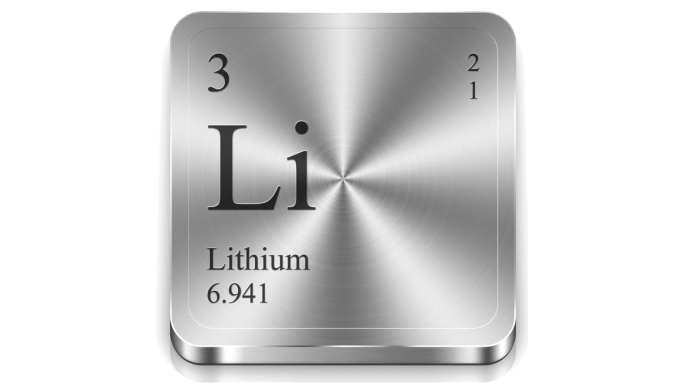
lithium [lith-ee-uh m] ExamplesWord Origin noun
- Chemistry. a soft, silver-white metallic element, the lightest of all metals, occurring combined in certain minerals. Symbol: Li; atomic weight: 6.939; atomic number: 3; specific gravity: 0.53 at 20°C.
- Pharmacology. the substance in its carbonate or citrate form used in the treatment or prophylaxis of bipolar disorder or mania.
Origin of lithium From New Latin, dating back to 1810–20; see origin at lith-, -ium Examples from the Web for lithium Contemporary Examples of lithium
Was being on the lithium responsible in some way for her being blinded to what was right in front of her eyes?
‘Homeland’ Showrunner: ‘We Knew We Had to Plot a New Course’
Andrew Romano
September 30, 2013
But it would probably be a mistake to think that lithium technology will get dramatically better than it currently is.
Would Putting a Price on Carbon Pave the Way for Electric Cars?
Megan McArdle
January 22, 2013
But she says she was told that the only alternative was lithium, which can have severe side effects.
Former Student Claims U.S. Naval Academy Had ‘Zero Tolerance’ for Rape Victims
Jesse Ellison
May 4, 2012
Agassi strategized to make the lithium ion batteries able to be charged at home and work for up to 90 miles.
The New Frontier of Electric Cars
Jacquelynn D. Powers
August 10, 2010
At age 15, during a reduction in his lithium dosage, Evan jumped to his death from a window.
Sara Reistad-Long
September 2, 2009
Historical Examples of lithium
The writer has no experience of the bromide of lithium (Bartholow).
A System of Practical Medicine By American Authors, Vol. II
Various
Lithium is absent, and Sodium is only present in very minute quantity.
G. F. Rodwell
Random samplings from various parts of the area show that the ash consists of magnesium, lithium, and beryllium carbonates.
Gordon Randall Garrett
Nor had he tried to steal any of the fusion materials—the heavy isotopes of hydrogen or any of the lithium isotopes.
Gordon Randall Garrett
He has shown apparently that lithium, when acted upon by radium emanations, changes to some extent to copper.
James J. Walsh
British Dictionary definitions for lithium lithium noun
- a soft silvery element of the alkali metal series: the lightest known metal, used as an alloy hardener, as a reducing agent, and in batteries. Symbol: Li; atomic no: 3; atomic wt: 6.941; valency: 1; relative density: 0.534; melting pt: 180.6°C; boiling pt: 1342°C
Word Origin for lithium C19: New Latin, from litho- + -ium Word Origin and History for lithium n.
silver-white metallic element, 1818, with element ending -ium + lithia, Modern Latin name given by Swedish chemist Jöns Jacob Berzelius (1779-1848) to the earth from which it was extracted, from Greek lithos “stone” (see litho-). So called from its mineral origin and to distinguish it from two previously known alkalis of vegetable origin.
lithium in Medicine lithium [lĭth′ē-əm] n. Symbol Li
- A soft, highly reactive metallic element whose carbonate form is used in psychopharmacology. Atomic number 3.
lithium in Science lithium [lĭth′ē-əm] Li
- A soft, silvery metallic element of the alkali group that occurs in small amounts in some minerals. It is the lightest of all metals and is highly reactive. Lithium is used to make alloys, batteries, glass for large telescopes, and ceramics. Atomic number 3; atomic weight 6.941; melting point 179°C; boiling point 1,317°C; specific gravity 0.534; valence 1. See Periodic Table.
 Liberal Dictionary English Dictionary
Liberal Dictionary English Dictionary